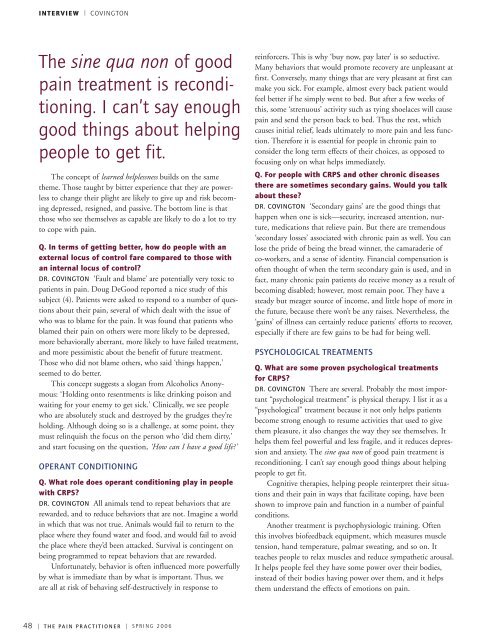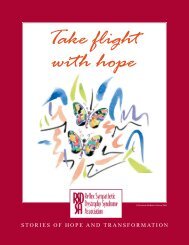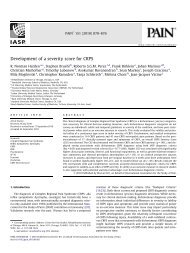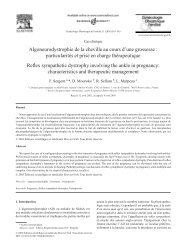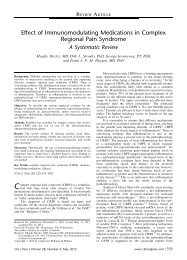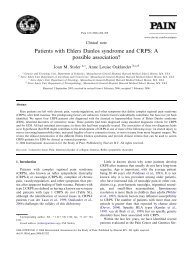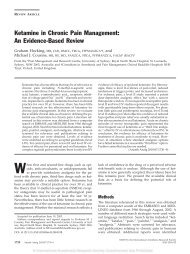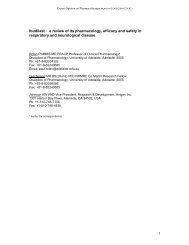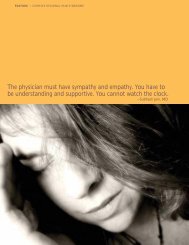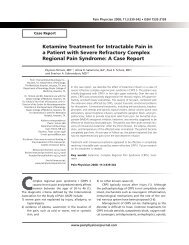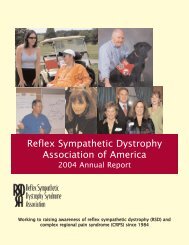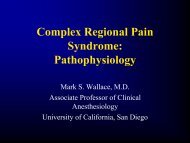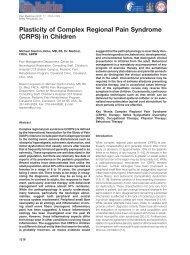printer-friendly version (PDF) - Reflex Sympathetic Dystrophy ...
printer-friendly version (PDF) - Reflex Sympathetic Dystrophy ...
printer-friendly version (PDF) - Reflex Sympathetic Dystrophy ...
You also want an ePaper? Increase the reach of your titles
YUMPU automatically turns print PDFs into web optimized ePapers that Google loves.
INTERVIEW | COVINGTON<br />
The sine qua non of good<br />
pain treatment is reconditioning.<br />
I can’t say enough<br />
good things about helping<br />
people to get fit.<br />
The concept of learned helplessness builds on the same<br />
theme. Those taught by bitter experience that they are powerless<br />
to change their plight are likely to give up and risk becoming<br />
depressed, resigned, and passive. The bottom line is that<br />
those who see themselves as capable are likely to do a lot to try<br />
to cope with pain.<br />
Q. In terms of getting better, how do people with an<br />
external locus of control fare compared to those with<br />
an internal locus of control?<br />
DR. COVINGTON ‘Fault and blame’ are potentially very toxic to<br />
patients in pain. Doug DeGood reported a nice study of this<br />
subject (4). Patients were asked to respond to a number of questions<br />
about their pain, several of which dealt with the issue of<br />
who was to blame for the pain. It was found that patients who<br />
blamed their pain on others were more likely to be depressed,<br />
more behaviorally aberrant, more likely to have failed treatment,<br />
and more pessimistic about the benefit of future treatment.<br />
Those who did not blame others, who said ‘things happen,’<br />
seemed to do better.<br />
This concept suggests a slogan from Alcoholics Anonymous:<br />
‘Holding onto resentments is like drinking poison and<br />
waiting for your enemy to get sick.’ Clinically, we see people<br />
who are absolutely stuck and destroyed by the grudges they’re<br />
holding. Although doing so is a challenge, at some point, they<br />
must relinquish the focus on the person who ‘did them dirty,’<br />
and start focusing on the question, ‘How can I have a good life?’<br />
OPERANT CONDITIONING<br />
Q. What role does operant conditioning play in people<br />
with CRPS?<br />
DR. COVINGTON All animals tend to repeat behaviors that are<br />
rewarded, and to reduce behaviors that are not. Imagine a world<br />
in which that was not true. Animals would fail to return to the<br />
place where they found water and food, and would fail to avoid<br />
the place where they’d been attacked. Survival is contingent on<br />
being programmed to repeat behaviors that are rewarded.<br />
Unfortunately, behavior is often influenced more powerfully<br />
by what is immediate than by what is important. Thus, we<br />
are all at risk of behaving self-destructively in response to<br />
reinforcers. This is why ‘buy now, pay later’ is so seductive.<br />
Many behaviors that would promote recovery are unpleasant at<br />
first. Conversely, many things that are very pleasant at first can<br />
make you sick. For example, almost every back patient would<br />
feel better if he simply went to bed. But after a few weeks of<br />
this, some ‘strenuous’ activity such as tying shoelaces will cause<br />
pain and send the person back to bed. Thus the rest, which<br />
causes initial relief, leads ultimately to more pain and less function.<br />
Therefore it is essential for people in chronic pain to<br />
consider the long term effects of their choices, as opposed to<br />
focusing only on what helps immediately.<br />
Q. For people with CRPS and other chronic diseases<br />
there are sometimes secondary gains. Would you talk<br />
about these?<br />
DR. COVINGTON ‘Secondary gains’ are the good things that<br />
happen when one is sick—security, increased attention, nurture,<br />
medications that relieve pain. But there are tremendous<br />
‘secondary losses’ associated with chronic pain as well. You can<br />
lose the pride of being the bread winner, the camaraderie of<br />
co-workers, and a sense of identity. Financial compensation is<br />
often thought of when the term secondary gain is used, and in<br />
fact, many chronic pain patients do receive money as a result of<br />
becoming disabled; however, most remain poor. They have a<br />
steady but meager source of income, and little hope of more in<br />
the future, because there won’t be any raises. Nevertheless, the<br />
‘gains’ of illness can certainly reduce patients’ efforts to recover,<br />
especially if there are few gains to be had for being well.<br />
PSYCHOLOGICAL TREATMENTS<br />
Q. What are some proven psychological treatments<br />
for CRPS?<br />
DR. COVINGTON There are several. Probably the most important<br />
“psychological treatment” is physical therapy. I list it as a<br />
“psychological” treatment because it not only helps patients<br />
become strong enough to resume activities that used to give<br />
them pleasure, it also changes the way they see themselves. It<br />
helps them feel powerful and less fragile, and it reduces depression<br />
and anxiety. The sine qua non of good pain treatment is<br />
reconditioning. I can’t say enough good things about helping<br />
people to get fit.<br />
Cognitive therapies, helping people reinterpret their situations<br />
and their pain in ways that facilitate coping, have been<br />
shown to improve pain and function in a number of painful<br />
conditions.<br />
Another treatment is psychophysiologic training. Often<br />
this involves biofeedback equipment, which measures muscle<br />
tension, hand temperature, palmar sweating, and so on. It<br />
teaches people to relax muscles and reduce sympathetic arousal.<br />
It helps people feel they have some power over their bodies,<br />
instead of their bodies having power over them, and it helps<br />
them understand the effects of emotions on pain.<br />
48 | T H E PA I N P R A C T I T I O N E R | S P R I N G 2 0 0 6


